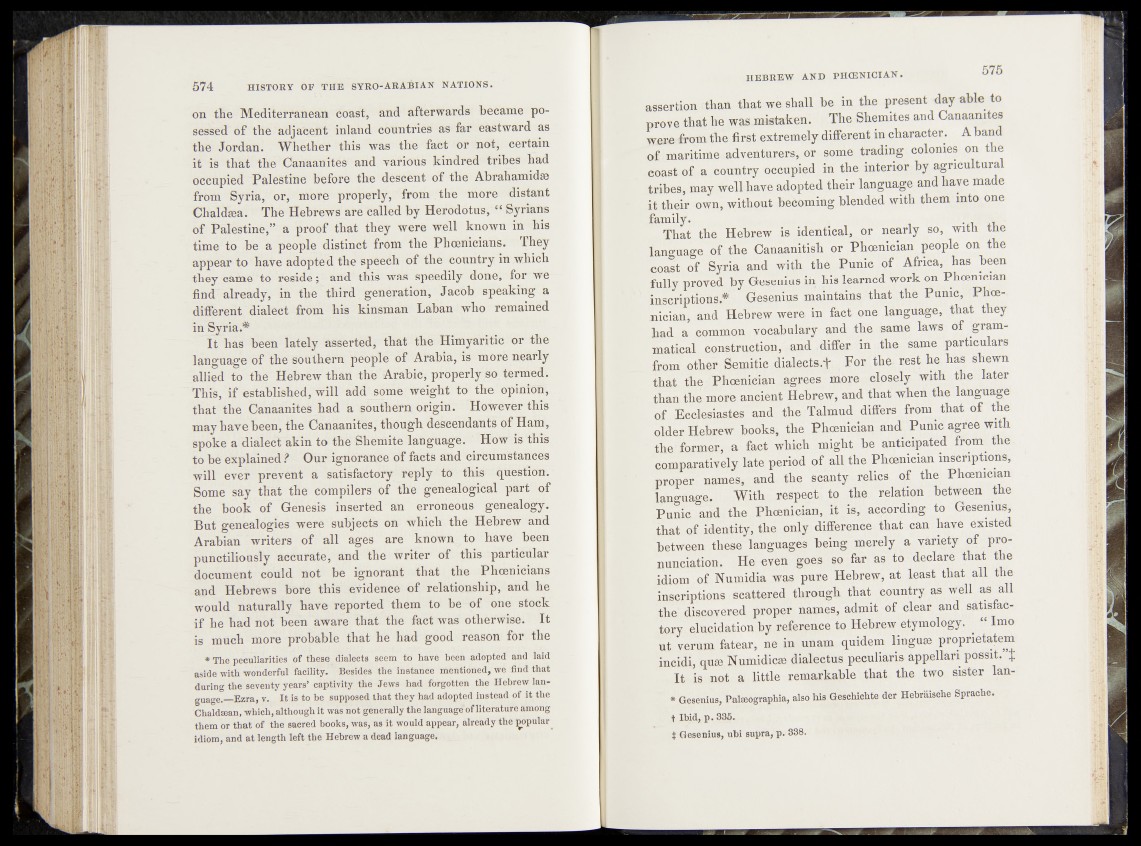
on the Mediterranean coast, and afterwards became po-
sessed of the'adjafcent inland countries as far eastward as
the Jordan. Whether tMs! was the fact or not, certain
it is that the Canaanites and various kindred tribes had
occupied "Palestine before the déscênt of the Abrahamidae
from Syria, or, mare properly, from the more distant
Chaldsea. The Hebrews are called by Herodótusf w Syrians
of Palestine,” a proof that they were well known in his
time tö be a péaple distinct from the Phoenicians, fhey
appear to have adopted the speech of the country m which
theyrcame to reside j and this was speedily done, for" we
find already, in the third generation, Jacob speaking a
different dialect from his kinsman Laban .Who remained
in Syria.*
It has been lately asserted, that the Himyaritic or the
language of the southern people óf Arabia, is moré nearly
allied to the Hebrew than the Arabic, fSfoperlyso; termed.
This, if established, will add some weight to the opinion,
that the Canaanites had a southern Origin. However this
may have been, the Canaanites, though descendant! óf Ham,
spoke a dialect akin to the Shemite language. How is this
to be explained ? Our ignorance of facts and circumstances
will ever prevent a satisfactory reply to this question.
Some say that the compilers of the genealogical part of
the book of Genesis inserted an erroneous genealogy.
But genealogies were subjects on which the Hebrew and
Arabian writers of all ages are known ,to have been
punctiliously accurate, and the writer of this particular
document could not be ignorant that the Phoenicians
and Hebrews bore this evidence of relationship, and he
would naturally have reported them to be of oiie stock
if he had not been aware that the fact was otherwise. It
is much more probable that he had good reason for the
* The peculiarities of these dialects seem to have been adopted and laid
" aside with wonderful facility. Besides the instance mentioned, we find that
during the seventy years’ captivity the Jews had forgotten the Hebrew lan-
guage.-r-Ezra, v. I t is to be supposed th a t they had adopted instead of it the
Chaldman, which, although it was hot generally the language* of literature among
them or th a t of the sacred books, was, as i t would appear, already the popular ^
idiom, and a t length left the Hebrew a dead language. ±
assertion than that we shall be in the present day able to
prove that he was mistaken. The^Shemites and Canaanites
were from the first extremely different in character. A band
of maritime adventurers, or some trading colonies on the
coast of a country occupied in the interior by agricultura
tribes, may» well haye adopted their language and have made
it their .own; without beaming blended with them into one
family. A , ,
That tX^ Hebrewlp identical,, or pearly so, with tUe
"language of th$ Canaanitish or Phoenician people on the
coast ofSyria and witji the. Punic of Africa, has been
.fully proved bwG^sfenius in his learned work on Phoenician
inscriptions.* Gesenius.’maintains that the Punic, Phoe-.
' jiician, and Hebrew we,rsp< in fact one language, that they
had a common* * vocabulary and the same laws of grammatical
construction, and differ in the same particulars
from other,, S;emi^ip. dialects.+ For ,the, rest he has shewn
that the ^Phoenician agrees more closely with the later
thaniWmore ancient Hebrew, and that when the language
of Eeclesiashes and the Talmud differs from that of the
older Hebrew hooks, the Phoenician and Punic agree with
the former, a fact which might be anticipated from the
comparatively tete period of allthe Phoenician inscriptions,
proper names, and the scanty Ellies of the Phoenician
language. With respect to the relation between the
Punic and the Phoenician, it is, according to Gesenius,
that of identity.; the only difference that can have existed
between these languages being merely a variety of pronunciation.
He even goes so far as to declare that the
idiom of Numidia was pure Hebrew, at least that all the
inscriptions scattered through thaf eountry as well as all
the' discovered proper names, admit of clear and satisfactory
elucidation by reference to Hebrew etymology, j “ Imo
ut verum fatear, ne in unam quidem linguae proprietatem
incidi, quse.Numidicae dialectus peculiars appellari possit. $
It is not a little remarkable that the two sister lan-
* Gesenius, Palseographia, also his Geschichte der Hebraisehe Sprache.
t Ibid, p . 336.
$ Gesenius, ubi supra, p. 838.